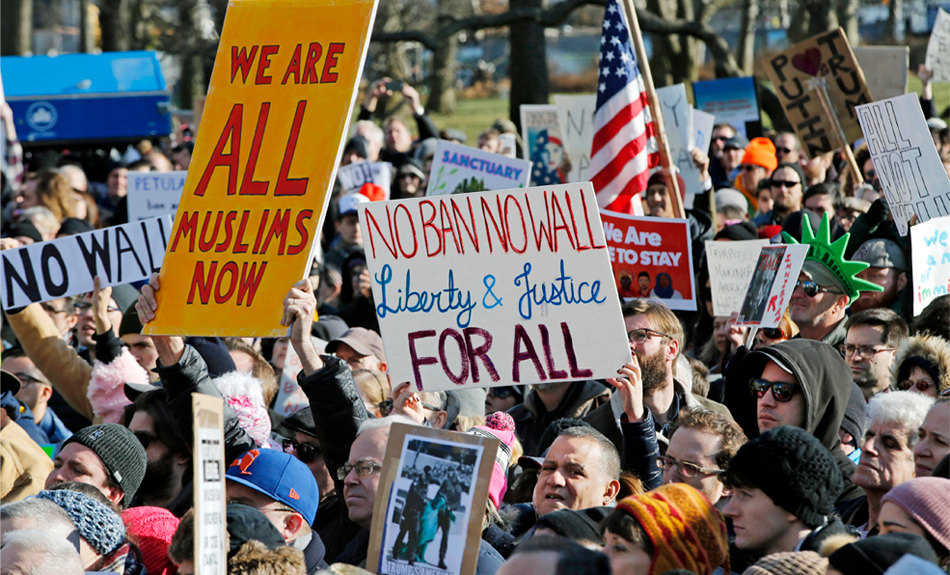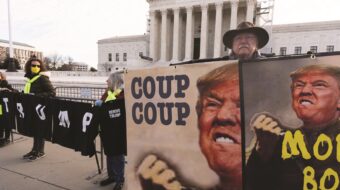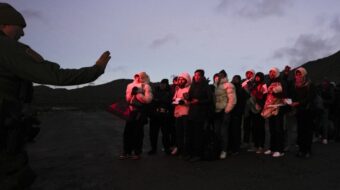
The Supreme Court said Friday, January 22 that it will decide the legality of the Trump’s most recent version of the Muslim travel ban and whether his responsibility to protect the nation gives him the authority to ban travelers from specific countries.
The high court will rule by June in the case, setting up a major analysis of presidential powers.
Issued last fall, Trump’s third revision of the travel ban bars travelers from eight countries, six of them with Muslim majorities.
While lower courts have struck down each version of the ban, the conservative-leaning Supreme Court has given the Trump administration a glimmer of hope that he may be able to enforce one of the most controversial and divisive initiatives of his presidency.
By accepting the case for oral arguments in April, the high court said it would consider the statutory justification for Trump’s actions and arguments against the ban from challengers who view it as an unconstitutional restriction based on religious discrimination.
Signed a week after his inauguration, Trump’s first travel ban sparked outrage and prompted large demonstrations at airports nationwide. The president’s comments and tweets about immigration, undocumented immigrants, and terrorism during his presidential campaign and while in office have ensured that the issue stays in the forefront of public debate.
In the administration’s request for a decision on the travel ban, Solicitor General Noel J. Francisco said the high court must re-establish the vast authority of the president when the nation’s security is at stake.
“The courts below have overridden the president’s judgments on sensitive matters of national security and foreign relations, and severely restricted the ability of this and future presidents to protect the nation,” Francisco wrote in his petition to the court.
Challengers to the ban say Trump has exceeded his legal authority.
“No prior president has attempted to implement a policy that so baldly exceeds the statutory limits on the president’s power to exclude, or so nakedly violates Congress’s bar on nationality-based discrimination in the issuance of immigrant visas,” said Hawaii’s brief asking the court to let lower-court decisions stand.
High court justices delivered an unsigned opinion last month—with only Justices Ruth Bader Ginsberg and Sonia Sotomayor dissenting—allowing Trump’s latest version of the ban go into effect while legal challenges to the order continued in the lower courts—a slight indication that the Supreme Court will be more sympathetic to the administration.
The current version of the ban places restrictions on travelers from Syria, Libya, Iran, Yemen, Chad, Somalia, North Korea, and Venezuela.
North Korea and Venezuela are not part of the challenge as they do not have Muslim-majority populations.
They high court will review a unanimous ruling from a three-judge panel of the U.S. Court of Appeals for the 9th Circuit in San Francisco.
In its decision, the 9th Circuit appellate court found that Trump had exceeded his lawful authority and that he had not made a legally sufficient finding that entry of those blocked travelers would be “detrimental to the interests of the United States.”
In another challenge, the U.S. Court of Appeals for the 4th Circuit in Richmond is considering a ruling by a Maryland judge who found that the ban violates the Constitution because it is essentially a ban on Muslims.
Judge Theodore D. Chuang took Trump’s statements and tweets into consideration in reaching his decision.
“Whereas prior orders of the president were designed to facilitate the review, the [current] Proclamation directly responds to the completed review and its specific findings of deficiencies in particular countries,” wrote Francisco in the administration’s petition, explaining that the third version of the ban followed an intense review process to determine which countries did not have procedures in place to screen out potential threats to the United States.
In response, the state of Hawaii argues that this current ban is worse than the previous one.
“The president has issued a proclamation, without precedent in this nation’s history, that purports to ban over 150 million aliens from this country based on nationality alone,” said Washington lawyer Neal K. Katyal, writing the brief for the state of Hawaii. “The immigration laws do not grant the president this power: Congress has delegated him only a measure of its authority to exclude harmful aliens or respond to exigencies, and it has expressly prohibited discrimination based on nationality.”
Follow the case here: Trump v the State of Hawaii.












Comments